
| Beer & Guanxi Midwest Chinese Chamber of Commerce at Karrikin Spirits & Microbrewery Mariemont, 10/19/2021 |

Book Review: HENRY KISSINGER: ON CHINA. First published in 2011 by The Penguin Press, a member of Penguin Group (USA) Inc. DOES HENRY REALLY UNDERSTAND CHINESE? In a few days, it will be June 4 and the 24th Anniversary of Tienanmen. In a week, the new Chinese President Xi Jinping will meet with President Barack Obama for the first time in California to discuss security issues. This is also the year of the 90th birthday of Henry Alfred Kissinger. It is a propitious time to review the Nobel Peace Prize Laureate's latest book, "ON CHINA." Dr. Henry Kissinger is a teacher, as well as, a practitioner extraordinaire of Realpolitik - in the footsteps of Machiavelli, Richelieu, Bismark, and his contemporary, President Richard M. Nixon. In his book, Dr. Kissinger turns his attention from Europe and gazes further eastward towards China. Given global realities, he could have focused directly on China by going westward, since he writes from the American national interest. The United States of America entered the world stage in the name of democracy by exerting power across the Atlantic Ocean but presently, prominence must also be exerted across the Pacific. This geopolitical reality is almost unique to the United States and may be readily inferred from the book. It is through his analysis of the balance of power in Europe that Dr. Kissinger made his mark as a scholar, but he is indebted to China for his renown as a statesman. But does Henry really understand Chinese? Let us explore this further. Dr. Kissinger opens his book by calling China a "Singularity," noting that China is the only ancient civilization that does not have a founding myth, a story of how a people began. Reading the first few pages, one is beguiled into thinking that Dr. Kissinger's interest in writing about China is sublimely philosophical, even theological. This is furthest from the truth because it quickly becomes obvious that his interest firmly lies in the practical aspects of a cooperative Sino-American relationship, notwithstanding the deep cultural and ideological divides that bedevil the liaison. Quickly, Kissinger launches into an analysis of the ancient Chinese game of wei qi (better known in the West as "go") and the perceptive reader can grasp that he also has on his mind the American game of "containment" (à la George Kennan). On matters of Chinese antiquity, Kissinger has the audacity to place Sun Tzu on an equal plane with Confucius, this being sure to raise some Chinese eyebrows. I count him as quoting Sun Tzu on War more often than Confucius on Ethics (whom he merely mentions), perhaps revealing that Kissinger knows that Sino-American relations have been strained by war, such as the Vietnam and Korean Wars (where US troops engaged Chinese). This takes us to the purpose of Dr. Kissinger's book - how to continue mutually beneficial and peaceful relations between two superpowers. Dr. Kissinger waxes nostalgic about Triangular Diplomacy (USA-USSR-China) and his pivotal but then secret role in setting up the Nixon-Mao meeting in China in 1972 and the Shanghai Communiqué. He shares, somewhat but not quite all pedagogically, key details of his various intimate conversations with Chinese leaders such as Chairman Mao, Zhou Enlai, Deng Xiaopeng (dubbed "The Indestructible Deng"), Jiang Zemin, and Hu Jintao. These colorful dialogues which transpired over many decades, span humorously earthy quips (e.g. "touching the tiger's buttocks"), fearsome saber-rattling, and other calculated tantrums (e.g. Mao's diatribes on his lack of fear of atomic weapons when China still was without the Bomb) - all of which promise to be a good hearty read. Kissinger in his polished fashion is gentle, even generous in describing friend and foe, domestic or foreign; when necessary he resorts to adjectives such as "prolix" and "mordant." None can write a book on modern China without coming to grips with the 1989 Tiananmen Massacre. Dr. Kissinger's account has drawn criticism from many quarters, The penchant of the former National Security Advisor and Secretary of State for secrecy is legendary. His perceived disdain for imposing democracy and the knee-jerk advancement of human rights (such as the little triangle between China-Vietnam-Khmer Rouge) have also earned him many critics. The New York Times has noted that "the severest test of the quasi alliance, of course, was the brutal suppression of democratic strivings in Tiananmen Square in 1989," and "that violent crackdown also tested Kissinger’s tolerance for the assertion of American values in foreign relations." In his defense, it must be said that Kissinger, at all times, gives priority to the perpetuation of cooperation between China and the USA. His highest values, perhaps as a result of infantry combat experience during the Allied advance on Berlin and subsequent civilian work for nuclear arms control during the Cold War, are found ultimately in the effort to avoid tensions that may precipitate war. Kissinger must be somberly read in all the chapters for anyone to come to any conclusion on this complex balancing of values, but perhaps this quote from the book can get the inquiry started: “The best outcome in the American debate would be to combine the two approaches: for the idealists to recognize that principles need to be implemented over time and hence must be occasionally adjusted to circumstance; and for the ‘realists’ to accept that values have their own reality and must be built into operational policies.” Dr. Kissinger closes his tome with that well worn Question, "Does History Repeat Itself?" Well versed in the peace protocols attempted at Westphalia onwards to Yalta (-Potsdam), he seeks to extend the lessons of 20th century Europe, including a presentation of the Eyre Crowe Memorandum on pre-World War I Germany to interactions with China in the 21st. China now as the newest superpower will more and more bring her understanding of "Bringing Peace Under Heaven" (平天下 - ping tian xia) to bear on affairs of the world. So, we come full circle to that first question - does Henry really understand Chinese? This question has fascinated me for a while. Even after reading "On China" a few times over, it is not very apparent or clear that Henry does understand Chinese. All the salient conversations he recounts in the book were conducted through English-Chinese interpreters. He never incorporated Chinese script in his book. In the Preface, he acknowledged that the lawyer Schuyler Schouten assisted with translations of Chinese documents. Nonetheless, it will not surprise me that over the years Dr. Kissinger indeed has mastered a working command of a difficult language, but in the best traditions of the land of Crouching Tigers and Hidden Dragons, he has, perhaps out of modesty, or more likely, pragmatism, never professed his competence.1 1 Unlike President Jiang Zemin, who according to Kissinger, "with non-Chinese visitors, ... regularly incorporated English or Russian or even Romanian expressions into his presentations to emphasize a point - shifting without warning between a rich sense of Chinese classical idioms and such American colloquialisms as 'it takes two to tango.'" |

| In photo from Left to Right: Charleston C. K. Wang Esq, Dr. Nancy L Zimpher, Charlie Zhao (President of GCCCC), Mark Conover, Administrator WANGLAW, Xiao Jie Zavon, Dr. Mitch Leventhal and Peggy Lovro. |



Photocredit: GCCCC

Members of the Greater Cincinnati Chamber of Commerce and the Greater
Cincinnati Chinese Music Society attended a presentation by Theodore Foss,
Associate Director of the Center for East Asian Studies at The University of Chicago,
on the story and music of Nixon in China. Prof. Foss revealed some of the source
material for the opera's composer, John event in international relations of the last
century, Nixon in China will premiere in Cincinnati on July 12 and 14, 2007. For
ticket and other information, click here. Cunningham (member of Board of
Cincinnati Opera), Xiaojie Zavon, Charleston C.K. Wang, Dr. P. J. Kao, and Evans
Mirageas, Artistic Director, Cincinnati Opera.
Cincinnati Chinese Music Society attended a presentation by Theodore Foss,
Associate Director of the Center for East Asian Studies at The University of Chicago,
on the story and music of Nixon in China. Prof. Foss revealed some of the source
material for the opera's composer, John event in international relations of the last
century, Nixon in China will premiere in Cincinnati on July 12 and 14, 2007. For
ticket and other information, click here. Cunningham (member of Board of
Cincinnati Opera), Xiaojie Zavon, Charleston C.K. Wang, Dr. P. J. Kao, and Evans
Mirageas, Artistic Director, Cincinnati Opera.
On 01/25/07, members of the Greater Cincinnati Chinese Chamber of Commerce attended a town
meeting with Shell Oil Company at the Hilton Netherland Plaza in downtown Cincinnati. A candid,
yet constructive dialogue on the future of energy security was exchanged between a broad group of
civic and business leaders of the community and senior management of Shell Oil. Timely topics
explored included developing fossil-fuel resources, creating a new mix of energy sources, and
public awareness of energy challenges facing the Nation, including environmental, life-style, and
global considerations. Shell also gave an overview of current operations and Shell's future plans
to meet America's energy needs. Shown in photograph above from left to right are Dan McCabe,
President of Environmental Enterprises, Inc (EEI is a GCCCC corporate member), Xiaojie Zavon,
Vice President of GCCCC, John D. Hofmeister, President of Shell Oil Company, and Charleston
Wang, member of the executive committee of GCCCC (and formerly VP & General Counsel to EEI).
meeting with Shell Oil Company at the Hilton Netherland Plaza in downtown Cincinnati. A candid,
yet constructive dialogue on the future of energy security was exchanged between a broad group of
civic and business leaders of the community and senior management of Shell Oil. Timely topics
explored included developing fossil-fuel resources, creating a new mix of energy sources, and
public awareness of energy challenges facing the Nation, including environmental, life-style, and
global considerations. Shell also gave an overview of current operations and Shell's future plans
to meet America's energy needs. Shown in photograph above from left to right are Dan McCabe,
President of Environmental Enterprises, Inc (EEI is a GCCCC corporate member), Xiaojie Zavon,
Vice President of GCCCC, John D. Hofmeister, President of Shell Oil Company, and Charleston
Wang, member of the executive committee of GCCCC (and formerly VP & General Counsel to EEI).
On 03/03/2006, Mr. Desuan Terrell, one of the serial robbers who preyed on Asian-American
restaurants around Greater Cincinnati, pled guilty in the Court of Common Pleas of Hamilton
County, Ohio to three counts of aggravated robbery with a firearm and is facing a 3-8 year prison
term. He has also been ordered to be transferred to the Butler County jail to appear in court for
robberies which occurred in that County. His alleged accomplice, Mr. Lamar Taylor is awaiting
trial in Hamilton County and his case is scheduled for a jury trial before Judge Martin on
04/14/2006. The arrest and conviction of Mr. Terrell resulted from the good police work at the
Springfield Township Police Department.
restaurants around Greater Cincinnati, pled guilty in the Court of Common Pleas of Hamilton
County, Ohio to three counts of aggravated robbery with a firearm and is facing a 3-8 year prison
term. He has also been ordered to be transferred to the Butler County jail to appear in court for
robberies which occurred in that County. His alleged accomplice, Mr. Lamar Taylor is awaiting
trial in Hamilton County and his case is scheduled for a jury trial before Judge Martin on
04/14/2006. The arrest and conviction of Mr. Terrell resulted from the good police work at the
Springfield Township Police Department.
| NEWS UPDATE: On 04/17/2006, Mr. Lamar Taylor pled guilty to all 3 counts of aggravated robbery with a firearm in Hamilton County Court of Common Pleas. He and Mr. Desuan Terell will each be sentenced to 6 years imprisonment in the courtroom of Judge Steven Martin on 04/28/2006 at 9:00am. In addition, on 04/18, Detective Jim Ohl from Springfield Township presented evidence to the Butler County Grand Jury for the crimes committed in that County. |
Photo Below: Xiao-jie Zavon, Baisong Zhao, Charleston Wang and Peggy Lovro of
the Greater Cincinnati Chinese Chamber of Commerce show off the Beijing Olympics
2008 Mascots and Banner. The Mascots, Beijing Friendlies, will be available at
Middfest International - China during weekend of September 30-October 2, 2006.
the Greater Cincinnati Chinese Chamber of Commerce show off the Beijing Olympics
2008 Mascots and Banner. The Mascots, Beijing Friendlies, will be available at
Middfest International - China during weekend of September 30-October 2, 2006.
Photograph Below: Baisong Zhao, President and other officers of the Greater Cincinnati Chinese
Commerce welcomed Mr. Bai Zhong, Chairman, Lada Cao, Deputy President, and other
delegates of the Wujun Changzhou Jiangsu Industry and Commerce Federation to Cincinnati. A
productive exchange of ideas and plans for cooperation were achieved between the two
Chambers of Commerce.
Commerce welcomed Mr. Bai Zhong, Chairman, Lada Cao, Deputy President, and other
delegates of the Wujun Changzhou Jiangsu Industry and Commerce Federation to Cincinnati. A
productive exchange of ideas and plans for cooperation were achieved between the two
Chambers of Commerce.
The Beijing Friendlies, Mascots for the Olympics 2008 Games in Beijing, China are based on
the Olympic Emblem. The Olympic flag incorporates the emblem of the Olympic Games - 5
interlocking rings in blue, yellow, black, green, and red. This was originally designed in 1913 by
Baron Pierre de Coubertin, the founder of the modern Olympic Games. Upon its initial
introduction, de Coubertin stated the following in the August, 1913 edition of Revue Olympique:
The emblem chosen to illustrate and represent the world Congress of 1914 ...: five intertwined
rings in different colours - blue, yellow, black, green, red - are placed on the white field of the
paper. These five rings represent the five parts of the world which now are won over to Olympism
and willing to accept healthy competition.
the Olympic Emblem. The Olympic flag incorporates the emblem of the Olympic Games - 5
interlocking rings in blue, yellow, black, green, and red. This was originally designed in 1913 by
Baron Pierre de Coubertin, the founder of the modern Olympic Games. Upon its initial
introduction, de Coubertin stated the following in the August, 1913 edition of Revue Olympique:
The emblem chosen to illustrate and represent the world Congress of 1914 ...: five intertwined
rings in different colours - blue, yellow, black, green, red - are placed on the white field of the
paper. These five rings represent the five parts of the world which now are won over to Olympism
and willing to accept healthy competition.


| Mascots of Olympics 2008 Beijing, China |


Photographs above: On 10/26/2006, the Greater Cincinnati Chinese Chamber of
Commerce held a networking meeting at the Sichuan Bistro located at 7888
Mason-Montgomery Road in Mason, Ohio. 50 old and new members were treated to
hot spicy Sichuan cuisine. President Baisong Zhao and other officers of the GCCCC
reviewed the accomplishments to date and presented a plan for a even more exciting
2007.
Commerce held a networking meeting at the Sichuan Bistro located at 7888
Mason-Montgomery Road in Mason, Ohio. 50 old and new members were treated to
hot spicy Sichuan cuisine. President Baisong Zhao and other officers of the GCCCC
reviewed the accomplishments to date and presented a plan for a even more exciting
2007.
A Show of Donna Salyer's Fabulous Furs - The World's Finest Faux Furs Wrapped up an exciting 18th Annual Kentucky International Trade Conference |
On 11/02/2006, the Greater Cincinnati Chinese Chamber of Commerce participated
in the 18th Annual Kentucky International Trade Conference which was held at the
Covington Convention Center. Shown in photograph above are Peggy Lovro.
Alfonso Cornejo (President of Hispanic Chamber Cincinnati USA) and Xiaojie Zavon.
in the 18th Annual Kentucky International Trade Conference which was held at the
Covington Convention Center. Shown in photograph above are Peggy Lovro.
Alfonso Cornejo (President of Hispanic Chamber Cincinnati USA) and Xiaojie Zavon.
| Photocredit: Charleston C. K. Wang 11/2/2006 |

Photo courtesy of Eileen Zhao
Photo above: On 11/28/2006, Baisong Zhao and Charleston Wang of the Greater Cincinnati
Chinese Chamber of Commerce met with Quinten L. Harris, Governor's Regional Representative
for the Ohio Department of Development at the Chamber's Office in the Wanglaw Building. This
was a planning meeting for coordinating upcoming projects and events for 2007 and will involve
activities with representatives at varying levels between Chinese delegations and Ohio
government and the private sector. The GCCCC looks forward to a productive year in carrying out
its mission to promote business with China and appreciates the support of ODD.
Chinese Chamber of Commerce met with Quinten L. Harris, Governor's Regional Representative
for the Ohio Department of Development at the Chamber's Office in the Wanglaw Building. This
was a planning meeting for coordinating upcoming projects and events for 2007 and will involve
activities with representatives at varying levels between Chinese delegations and Ohio
government and the private sector. The GCCCC looks forward to a productive year in carrying out
its mission to promote business with China and appreciates the support of ODD.

Photo above: On 12/1/2006, Baisong Zhao and Charleston Wang of the Greater Cincinnati
Chinese Chamber of Commerce met with Daniele S. Longo, Vice President and Sarah Klamo,
Manager for Business Development & International Trade of the Northern Kentucky Chamber of
Commerce at the Wanglaw Buildng. Plans were laid for greater cooperation and new projects
between the two organizations for 2007 in particular concerning trade with China and other
countries in the Pacific Rim such as Malaysia and Indonesia.
Chinese Chamber of Commerce met with Daniele S. Longo, Vice President and Sarah Klamo,
Manager for Business Development & International Trade of the Northern Kentucky Chamber of
Commerce at the Wanglaw Buildng. Plans were laid for greater cooperation and new projects
between the two organizations for 2007 in particular concerning trade with China and other
countries in the Pacific Rim such as Malaysia and Indonesia.
Photo courtesy of Mary Joan Reutter, Esq.
| Detectives from Springfield Township Police meet with the Greater Cincinnati Chinese Chamber of Commerce to review arrests of robbers of Asian American restaurants. |
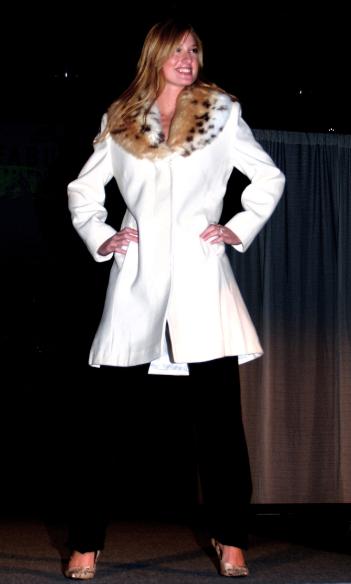


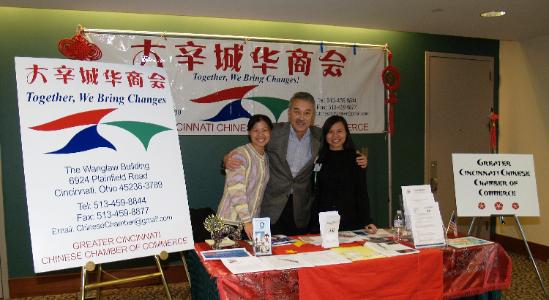
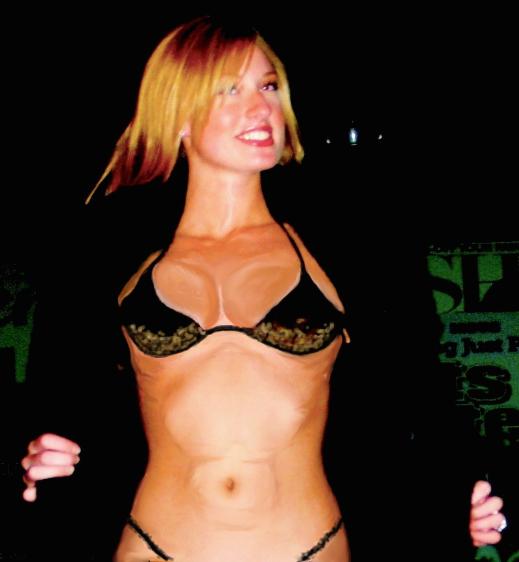
| Donna Salyer's Fabulous Furs |


| THE NEXT FACE OF CHINA An Opinion by Charleston C. K. Wang During the last decade, China astounded the world with an annual economic growth rate of around 10%. Presently, China is abundantly supplying the world with a cornucopia of affordable goods. This trade has created an emerging Chinese capitalistic class, and also fueled an expanding demand within China for raw materials, including oil. Economic prosperity has reignited a national pride that China yearns to showcase in the Summer Games. However, China is also straddled with internal conflicts, the most currently visible being the Question of Tibet. Can a totalitarian, godless state under the hegemony of the communist party withstand the aligned wills of the ancient gods of Mt. Olympus and those of the Himalayas with its peak at Mt. Qomolangma? This question must be on the minds of U. S. Secretary of the Treasury Henry Paulson and his Chinese hosts as they met once again for Strategic Economic Dialogue during the first week of April. While Mr. Paulson must be most concerned about stimulating economic growth for America in the face of cyclical recession, the political conundrum of Tibet is ever present. At this juncture of the fates, I see the need for continued vigil - the emergence of China as a 21st century economic superpower raises the inseparable question of what will be the next political face of China? From the beginning Karl Marx proclaimed a fundamental contradiction between capitalism and communism, an ideology now discredited by most nations. There appears an inevitable certainty that China’s political system must change to keep pace with her burgeoning capitalistic base. Under the light of 20th century experience, especially from a western perspective, it may seem that China has two options from which to choose (1) Democracy, or (2) Fascism. Clearly, it is in the national interest of the United States to continue to engage China economically, politically, and along all other facets. Through determined dialogue and astute economic incentive, America should continue to promote the virtues of democracy and demonstrate its suitability for sustained economic well-being. Only time will reveal the next face of China. Perhaps, as China is a cradle of ancient enlightenment well before the Renaissance of the west, the Chinese can reveal to the world yet another political theory that the World will call good. A version of this article was published as a Global Outlook in the Cincinnati Business Courier on May 9, 2008. |

02/11/2008: Shown in photo
on left is Mayor Mark Mallory
who met with Peter Song
(right) & Sam Yi (left) at
Cincinnati City Hall. The
Mayor is displaying a recent
edition of The Erie Chinese
Journal. Erie Chinese
Journal is published by Anne
Pu in Cleveland, Ohio and
starting in January has been
providing news coverage of
Cincinnati and the Southern
Ohio region. The Erie
Chinese Journal is a
bimonthly newspaper that is
available for no charge at
local Chinese business
establishments such as
restaurants and stores.
Contact the Erie Chinese
Journal at
echinesej@yahoo.com or by
telephone at (216)-324-2959
or by fax at (216) 405-3480.
on left is Mayor Mark Mallory
who met with Peter Song
(right) & Sam Yi (left) at
Cincinnati City Hall. The
Mayor is displaying a recent
edition of The Erie Chinese
Journal. Erie Chinese
Journal is published by Anne
Pu in Cleveland, Ohio and
starting in January has been
providing news coverage of
Cincinnati and the Southern
Ohio region. The Erie
Chinese Journal is a
bimonthly newspaper that is
available for no charge at
local Chinese business
establishments such as
restaurants and stores.
Contact the Erie Chinese
Journal at
echinesej@yahoo.com or by
telephone at (216)-324-2959
or by fax at (216) 405-3480.
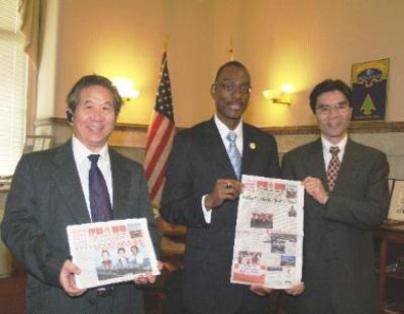
| A CURE FOR THE AMERICAN MALAISE The Malaise Thanks to all the election finger-pointing and blame-casting at a time when national unemployment hovers around double digits, a realization dawned on me, one that I thought best shared after the New Congress are back in business. As a nation, we are infected with a creeping disease that forebodes more agony unless we confront it for what it is. The malaise is our addiction to debt. Debt is debilitating us collectively as cities, counties, states, and the federal government are unable to balance their budgets. Surely, all this is nothing new to me and to you. The extra realization is that the addiction to debt does not begin with our governments. It all starts at the personal level because it is the addiction to individual over-borrowing that contributed to the subprime mortgage banking crisis which in turn precipitated the last economic recession. This in turn led to worsening deficits in the budgets of all levels of government. We are so inured to the addiction of debt, that few politicians have been willing to even discuss the cure. To reduce a deficit, according to conventional wisdom, one must cut spending or increase income. For the public sector, increasing income means to increase taxes. The problem is even more severe as its tentacles reach beyond our national border. We have run up a chronic deficit in our balance of trade, particularly with China. China thus holds a surplus of dollars which that creditor nation uses to buy our treasury paper which accounts for the imbalance in our federal budget. As of June 1, 2010, China (excluding Hong Kong) owned $868 billion in U.S. Treasuries which is 21% of a total $4.2 trillion held by foreign nations, making it the largest lender to the U.S. Government. Our domestic deficits are exacerbated by our internationalized national debt. When an individual defaults on his or her mortgage payment, the banker has recourse by foreclosing on the house and forcibly selling it to recover the loan. When our government runs a deficit, we have the political expedient of authorizing more debt, this being particularly true for the federal government. But, what happens when a major foreign creditor nation decides to call in its loan? Here we enter uncharted waters. No one knows for sure what will happen and when. Will it lead to a catastrophic loss in the buying power of the dollar, thus unleashing double digit inflation as prices rise in the U.S.? As the U.S. defaults on her international debt, will flaring national tempers lead to war between two superpowers? What if China experiences a burst in its economic bubble and casts about for someone to blame for its misery? The Cure These are some bewildering and frightening scenarios. There is however, a happier alternative. We, as individuals, must once again and at once muster our creativity and productivity to expand the economic base. We did it during the high-tech boom of the 1990's and we can do it again. It means taking stock in ourselves, individually and collectively as a nation with renewed optimism and focused purpose towards generating real value. It means invoking the will to cure ourselves of irresponsible overspending and financial chimeras. It means the gritty, tangible, and clever rebuilding of America. It means drawing upon our demonstrated Yankee prowess for invention through science, technology, and innovation. We must work harder and smarter. The cure is found not with our politicians but with each and everyone of us as we go about our daily work. It means not mortgaging our future to another country. And we must do this in a time of peace and never because we are in a world war. Charleston C K Wang 1/11/2011 References: http://www.treas.gov/tic/mfh.txt http://www.treasurydirect.gov/NP/NPGateway |
| PRESIDENT BARACK OBAMA WALKS THE WALK ON THE GREAT WALL OF CHINA. The last thing that President Barack Obama did during his first visit to China was to take a solitary stroll on the ramparts of the Great Wall of China. During those precious quiet minutes alone, what thoughts could have crossed his mind? Earlier, many hefty issues were raised with Hu Jintao, President of China and General Secretary of the Chinese Communist Party. Trade and currency, censorship, human rights, global warning, military cooperation, – these and others were broached and none conclusively resolved. Our President must have sensed a more muscular China, flexing and pushing harder against a United States still struggling at home with high unemployment and a high federal deficit. Could his mind’s eye wander back to that oversized portrait of Mao ZeDong still framing Tian An Men? If he did, he must have recalled the most famous, indeed, infamous of dicta of China’s Great Dictator – “Political Power Grows Out of the Barrel of the Gun.” If he did, he could have taken genuine comfort and even inspiration knowing that by his initiative and display of humility, he has taken great steps towards disarming the dead hand of the Chairman. When two mighty nuclear armed nations engage in dialogue, however chilly and seemingly unproductive, they are unlikely to resort to armed conflict, however great the differences. And the dialogue must and will continue. Did Obama think of another wall of recent memory – the Berlin Wall? If he did, he must have recalled the clarion challenge issued by President Ronald Reagan: “Mr. Gorbachev, tear down this wall.” If he did, our President must have smiled to himself and said very quietly “Mr. Hu, I shall be back.” And the World will be a better place for it. An Opinion by Charleston C. K. Wang, November 23, 2009 |
On 5/29/2007, Frank L. Lavin, Under-Secretary for the U. S.
Department of Commerce spoke on the importance of international
trade for the U.S. economy. Mr. Lavin was joined by Congressman
Steve Chabot at the Queen City Club, and they both fielded questions
from the luncheon audience (see top right insert photo).
Harvey Cohen, Esq. of Dinsmore & Shohl served as moderator.
Many issues of concern pertained to China, including the opening
up of the Chinese market, the protection of intellectual property there,
and the shadow of tariffs on Chinese goods. Shown in bottom right
insert photograph below are Secretary Lavin (third from left) with
members of the Greater Cincinnati Chinese Chamber of Commerce
from left to right, Charleston C. K. Wang, Xiaojie Zavon, Marcia
Brandstadt (Director, U.S.Export Assistance Center, U. S.
Department of Commerce), Peggy Lovro and Larry Grubbs.
Department of Commerce spoke on the importance of international
trade for the U.S. economy. Mr. Lavin was joined by Congressman
Steve Chabot at the Queen City Club, and they both fielded questions
from the luncheon audience (see top right insert photo).
Harvey Cohen, Esq. of Dinsmore & Shohl served as moderator.
Many issues of concern pertained to China, including the opening
up of the Chinese market, the protection of intellectual property there,
and the shadow of tariffs on Chinese goods. Shown in bottom right
insert photograph below are Secretary Lavin (third from left) with
members of the Greater Cincinnati Chinese Chamber of Commerce
from left to right, Charleston C. K. Wang, Xiaojie Zavon, Marcia
Brandstadt (Director, U.S.Export Assistance Center, U. S.
Department of Commerce), Peggy Lovro and Larry Grubbs.
| Photo above: On 5/15/2006, members of Greater Cincinnati Chinese Chamber of Commerce and other community leaders gave a warm welcome to the Ambassador of China, His Excellency and Mrs. Zhou (seated 3rd and 2nd from right). Ambassador Zhou Wenzhong was in town on a mission to promote trade and investment. After meeting with the GCCCC, the Chinese delegation will tour Procter & Gamble, General Electric in Evendale, and will meet with Governor Bob Taft in Columbus. Venue for this event was made available through the courtesy of the Regional Chamber. The Board of the GCCCC voted last week to become a joint organizational member of the Regional Chamber and GCCCC members can enjoy all the privileges and benefits of the Cincinnati USA Regional Chamber for one low price. For more information on joining the GCCCC and for latest on business news and happenings with China, click here. |
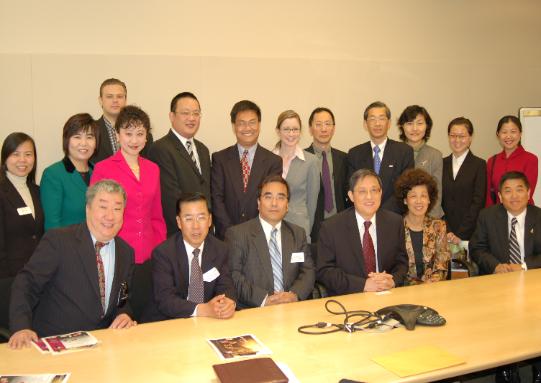
| Fact Sheet On the U.S.-China Strategic Economic Dialog This week U. S. Treasury Secretary Henry Paulsen and his team are meeting with a delegation headed by Chines Vice Premier Wu on the second round of Strategic Economic Dialogue. This high powered meeting between two economic giants is based on an agreement between President George W. Bush and President Hu Jintao that reflects the growing relationship between the U.S. and Chinese economies. The intent is to engage in discussions at the highest levels of government which will provide an overarching framework for ongoing productive bilateral economic dialogues and future economic relations. The top level meetings will address long-term strategic issues, as well as provide coordination among the specialized continuing dialogues. The Strategic Economic Dialogue will also be a forum for discussing ways the United States and China can work together to address economic challenges and opportunities as responsible stake-holders in the international economic system. The essential goal of this dialogue is to ensure that the benefits of our growing economic relationship with China are fairly shared by citizens of both countries. The Strategic Economic Dialogue will convene semi-annually in the United States and China, with the first meeting occurring before the end of 2006. Each of the two Presidents will strongly support and take an active role in the strategic economic dialogue. President Bush has designated Secretary of the Treasury Henry M. Paulson to lead the U.S. side of the dialogue. National Economic Adviser Al Hubbard and other members of the President's Cabinet will join Secretary Paulson. Additional U.S. agencies will include Commerce, U.S. Trade Representative, State, Health and Human Services, the Environmental Protection Agency, Energy and others. Deborah Lehr will serve as Special Envoy to the Strategic Economic Dialogue to ensure it receives the attention and continuity necessary to produce meaningful results. President Hu has designated Vice Premier Wu Yi to lead the Chinese side of the dialogue. In that role, she has been given full decision making authority across all aspects of the Chinese economy. To demonstrate the importance of the Dialogue, the Chinese government has created its largest and the highest ranking inter-ministerial working group which Vice Premier Wu Yi will chair, supported by Foreign Minister Li Zhaoxing, Finance Minister Jin Renqing, and Deputy Secretary General of the State Council Xu Shaoshi, as well as the Ministries of Commerce, Agriculture, Health, and Information Industries, the various financial regulators, the National Development and Reform Commission, the People's Bank of China and others. The Strategic Economic Dialogue will help to ensure leaders of the two countries can address critical economic challenges facing their economies, have a forum for discussing cross-cutting issues, and can make the most productive use of the existing bilateral commissions and dialogues. Likely themes of the discussions will include: building innovative societies, seizing the opportunities of global economic integration to assure sustained growth, and the economics of energy and conservation. The United States will also support China in China's goal of building a consumer-driven economy rooted in open markets. The intent of this dialogue is to discuss long-term strategic challenges, rather than seeking immediate solutions to the issues of the day. The discussion of long-term structural issues in the Strategic Economic Dialogue will provide a stronger foundation for pursuing concrete results through existing bilateral economic dialogues and ensuring citizens of both countries benefit fairly from the growing bilateral economic relationship. The new strategic dialogue will provide support and guidance for these existing bilateral economic forums, which will remain essential to managing specialized aspects of the interdependent U.S.-China economic relationship. These high level discussions will enhance, not diminish these existing forums. Bilateral issues will continue to receive full attention, including pressing China for floating exchange rates, greater intellectual property rights, and increasing market access. This Fact Sheet is courtesy of the U.S. Treasury and more information may be obtained at http://www.ustreas.gov/press/releases/hp107.htm |

Photographs below: On 5/13/2007, the Greater
Cincinnati Chinese Chamber of Commerce (GCCCC)
welcomed the Assistant Minister of Commerce of the
People's Republic of China, the Honorable Chao
Wang (fourth from left behind flag) who is heading an
investment and trade delegation to the United
States. The mission of the delegation are to promote
U.S.-China trade and economic cooperation, explore
investment opportunities and seek trade partners in
the Mid-West, and purchase U.S. products and
services. A banquest dinner for Mr. Wang and senior
members of his entourage at the Oriental Wok in Fort
Mitchell, Kentucky, were attended by the Executive
Committee of the GCCCC and other leaders of the
Chinese American community. Another 10 course
Chinese dinner was held for the larger delegation by
GCCCC on 5/14/2007
Cincinnati Chinese Chamber of Commerce (GCCCC)
welcomed the Assistant Minister of Commerce of the
People's Republic of China, the Honorable Chao
Wang (fourth from left behind flag) who is heading an
investment and trade delegation to the United
States. The mission of the delegation are to promote
U.S.-China trade and economic cooperation, explore
investment opportunities and seek trade partners in
the Mid-West, and purchase U.S. products and
services. A banquest dinner for Mr. Wang and senior
members of his entourage at the Oriental Wok in Fort
Mitchell, Kentucky, were attended by the Executive
Committee of the GCCCC and other leaders of the
Chinese American community. Another 10 course
Chinese dinner was held for the larger delegation by
GCCCC on 5/14/2007


| WANG NEWS®™SERVICE An Independent Source of News & Views |
GOT NEWS? GOT OPINION? Send your
information, photographs, or comments to
WANGNEWS for consideration to be published in
WANG NEWS SERVICE.
To send, use this email address: news@wangnews.net
information, photographs, or comments to
WANGNEWS for consideration to be published in
WANG NEWS SERVICE.
To send, use this email address: news@wangnews.net


Reach out to the
decision-makers, opinion-
shapers, and change-
agents of Greater
Cincinnati and the World.
ADVERTISE with
WANG NEWS SERVICE.
For terms and conditions,
you are invited to inquire
by email:
advertise@wangnews.net
decision-makers, opinion-
shapers, and change-
agents of Greater
Cincinnati and the World.
ADVERTISE with
WANG NEWS SERVICE.
For terms and conditions,
you are invited to inquire
by email:
advertise@wangnews.net
| Current U. S. Eastern Time: |
GOT RICE?
| Those who would give up Essential Liberty to purchase a little Temporary Safety, deserve neither Liberty nor Safety - Benjamin Franklin (1759). |
China Trade Page
GCCCC Gives Viewpoint in Cincinnati
Business Courier
March 2, 2007
Pragmatic immigration
policy could ease
money worries
by Charleston Wang
Mr. Wang practices immigration law and is on the executive committee of the Greater
Cincinnati Chinese Chamber of Commerce.
During Federal Reserve Chairman Ben Bernanke's report to the U S.
Senate on Jan. 18, he again voiced unease about the health of Social
Security and Medicare, in particular, and of the federal deficit in general.
Federal spending for Social Security, Medicare and Medicaid, while
taking up 8 1/2 percent of the Gross Domestic Product in 2006, is
projected to expand to roughly 15 percent of the GDP by 2030.
Bernanke warned that ''if early and meaningful action is not taken, the
U.S. economy could be seriously weakened," and he added a dire note
of urgency by saying that the "right time to start was about 10 years ago."
.........
The answer, therefore, is to enlarge the working tax base. This can be
done by increasing natural birth and waiting 18 or more years or by
opting for immediate benefits through a pragmatic immigration policy.
.........
For complete details on pragmatic immigration reform, please
read the entire OpEd published in the website of CINCINNATI
BUSINESS COURIER at
http://www.bizjournals.com/cincinnati/stories/2007/03/05/editorial3.html?
hbx=
Business Courier
March 2, 2007
Pragmatic immigration
policy could ease
money worries
by Charleston Wang
Mr. Wang practices immigration law and is on the executive committee of the Greater
Cincinnati Chinese Chamber of Commerce.
During Federal Reserve Chairman Ben Bernanke's report to the U S.
Senate on Jan. 18, he again voiced unease about the health of Social
Security and Medicare, in particular, and of the federal deficit in general.
Federal spending for Social Security, Medicare and Medicaid, while
taking up 8 1/2 percent of the Gross Domestic Product in 2006, is
projected to expand to roughly 15 percent of the GDP by 2030.
Bernanke warned that ''if early and meaningful action is not taken, the
U.S. economy could be seriously weakened," and he added a dire note
of urgency by saying that the "right time to start was about 10 years ago."
.........
The answer, therefore, is to enlarge the working tax base. This can be
done by increasing natural birth and waiting 18 or more years or by
opting for immediate benefits through a pragmatic immigration policy.
.........
For complete details on pragmatic immigration reform, please
read the entire OpEd published in the website of CINCINNATI
BUSINESS COURIER at
http://www.bizjournals.com/cincinnati/stories/2007/03/05/editorial3.html?
hbx=
CLICK ON PHOTO


Mr. Chao Wang, Assistant Minister of Commerce of China is introduced by Mr.
Charlie Zhao, President of the Greater Cincinnati Chinese Chamber of
Commerce. To the right of Mr. Wang is Ms. Xiaojie Zavon (Vice President of
GCCCC) and Mr. Zhanling Yuan, Economic & Commerical Consul of China
Charlie Zhao, President of the Greater Cincinnati Chinese Chamber of
Commerce. To the right of Mr. Wang is Ms. Xiaojie Zavon (Vice President of
GCCCC) and Mr. Zhanling Yuan, Economic & Commerical Consul of China
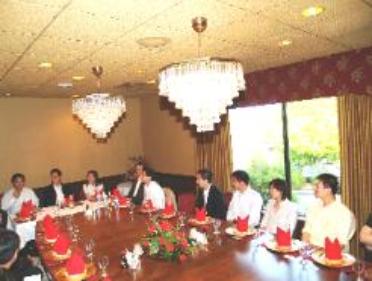

| Photo below shows Mr. Chao Wang, Assistant Minister of Commerce of China with Ellen van der Horst, President of the Cincinnati USA Regional Chamber of Commerce, Mayor Mark Mallory of the City of Cincinnati and Commissioner David Pepper of the County of Hamilton, Ohio on 05/14/2007. |

Below: On 5/14/2007, the Greater Cincinnati
Chamber of Commerce hosted a 10 course
Chinese dinner for the larger Chinese delegation.
Shown on photo below are Xiaojie Zavon,
VP/GCCCC, Mr, Yajun Liu, General Director of
Investment Promotion Agency of China Ministry of
Commerce, Charlie Zhao, President GCCCC and
the Honorable Martha Layne Collins, fomer
Governor of Kentucky (front row) and James
Zhang (GCCCC Dinner Chair - center of back row).
Chamber of Commerce hosted a 10 course
Chinese dinner for the larger Chinese delegation.
Shown on photo below are Xiaojie Zavon,
VP/GCCCC, Mr, Yajun Liu, General Director of
Investment Promotion Agency of China Ministry of
Commerce, Charlie Zhao, President GCCCC and
the Honorable Martha Layne Collins, fomer
Governor of Kentucky (front row) and James
Zhang (GCCCC Dinner Chair - center of back row).
| Photo below: Chris Bortz, a Member of Cincinnati City Council, Charlie Zhao, President GCCCC, & Jim Raussen, Ohio State Representative at the Chinese dinner. |



| Photo below: Chinese dignitaries are entertained by Greg Irwin, Finger Fitness Expert who demonstrated an amazing variety of Chinese juggling and hand tricks. Greg also explains and amuses with his Chinese language. |
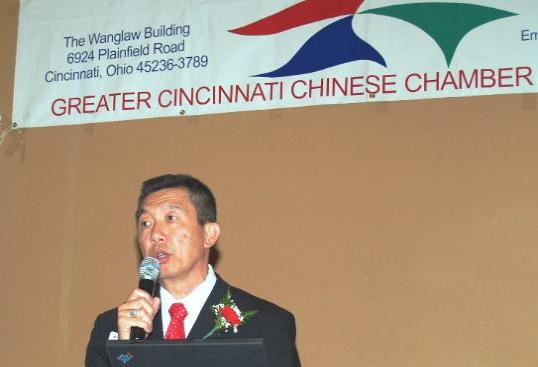
| Photo below: Mr. Lee Wong, a Trustee of West Chester Township, Butler County, Ohio, addresses the dinner guests, he being the singular elected official whose speech was made in Mandarin Chinese. Mr. Wong encourages investment and development in West Chester which is a thriving suburban township of 35 square miles with a diverse population of 59,000 and boasting a well balanced mix of residential and commercial development. |

Deloitte Tax LLP
Photo below shows Mr. James Ellerhorst, Cincinnati Office
Managing Partner of Deloitte Tax LLP, greeting all the
dinner guests. Deloitte fields a staff which includes 1600
Chinese speaking professionals in both the USA and
China. Shown in photo below are Mr. Ellerhorst and Ms.
Jennifer Zhang, Senior Manager in International Tax of
Deloitte Tax LLP.
Managing Partner of Deloitte Tax LLP, greeting all the
dinner guests. Deloitte fields a staff which includes 1600
Chinese speaking professionals in both the USA and
China. Shown in photo below are Mr. Ellerhorst and Ms.
Jennifer Zhang, Senior Manager in International Tax of
Deloitte Tax LLP.

| Photo below: Mr. James Zhang, Dinner Chair opens the dinner by expressing his welcome of the Chinese dignitaries and American guests. |

LINK TO ASIAN
STOCK INDICES
Nikkei 225
Shanghai Composite
Hang Seng
Taiwan Weighted
Straits Times
Kuala Lumpur
Bombay
Seoul Composite
Jakarta Composite
Thailand
Philippines
WORLD CLOCK
LINK TO SELECT
ASIAN DAILY NEWS
Asahi Simbun
China Daily
China Post
Economic Times
Jakarta Post
Japan TImes
Korea Times
Manila Times
South China Morning Post
Star
Straits Times
Taipei Times
Times of India
Xin Hua
It pays to keep up with
Asia, one continent, many
views - WANGNEWS®™
Congress shall make no law ... abridging the
freedom of speech, or of the press ...
STOCK INDICES
Nikkei 225
Shanghai Composite
Hang Seng
Taiwan Weighted
Straits Times
Kuala Lumpur
Bombay
Seoul Composite
Jakarta Composite
Thailand
Philippines
WORLD CLOCK
LINK TO SELECT
ASIAN DAILY NEWS
Asahi Simbun
China Daily
China Post
Economic Times
Jakarta Post
Japan TImes
Korea Times
Manila Times
South China Morning Post
Star
Straits Times
Taipei Times
Times of India
Xin Hua
It pays to keep up with
Asia, one continent, many
views - WANGNEWS®™
Congress shall make no law ... abridging the
freedom of speech, or of the press ...
| WANGLAW Attorneys & Counselors at Law |
<Read more directly from the Asian News
links provided in left column of this page.
It pays to keep up with Asia, one continent,
many views - WANGNEWS®™
Congress shall make no law ... abridging the
freedom of speech, or of the press ...
links provided in left column of this page.
It pays to keep up with Asia, one continent,
many views - WANGNEWS®™
Congress shall make no law ... abridging the
freedom of speech, or of the press ...
Global Outlook
U.S., China can find
terms they both
consider a fair trade
Cincinnati Business Courier
June 8, 2007 by Charleston Wang
Toward the end of May, the second round of
the Strategic Economic Dialogue was
completed in Washington, D.C., between the
United States and China. The largest bone of
contention between the Eagle and the Dragon
was the value of the Chinese renminbi, also
known as the yuan, vis-à-vis the U.S. dollar.
Given the fact that the balance of trade
between the two countries has for many years
been in favor of China ($232.5 billion in
2006), the value of the yuan should rise
against the dollar. Many in Congress
subscribe to the belief that the Chinese
government is unfairly preventing the yuan
from rising in proportion to the trade figures.
An underlying driving political force is the
protracted loss of American manufacturing
jobs through the globalization of labor. China
is one among many sources of cheaper
labor. .....
To read the entire OpEd by Charleston
Wang published in the website of
CINCINNATI BUSINESS COURIER go to:
com/cincinnati/stories/2007/06/11/editorial3.html
U.S., China can find
terms they both
consider a fair trade
Cincinnati Business Courier
June 8, 2007 by Charleston Wang
Toward the end of May, the second round of
the Strategic Economic Dialogue was
completed in Washington, D.C., between the
United States and China. The largest bone of
contention between the Eagle and the Dragon
was the value of the Chinese renminbi, also
known as the yuan, vis-à-vis the U.S. dollar.
Given the fact that the balance of trade
between the two countries has for many years
been in favor of China ($232.5 billion in
2006), the value of the yuan should rise
against the dollar. Many in Congress
subscribe to the belief that the Chinese
government is unfairly preventing the yuan
from rising in proportion to the trade figures.
An underlying driving political force is the
protracted loss of American manufacturing
jobs through the globalization of labor. China
is one among many sources of cheaper
labor. .....
To read the entire OpEd by Charleston
Wang published in the website of
CINCINNATI BUSINESS COURIER go to:
com/cincinnati/stories/2007/06/11/editorial3.html

| Greater Cincinnati Chinese Chamber of Commerce Welcomes Ambassador & Mrs. Zhou to the Queen City |
Photo Courtesy of Kay Qihong Liao
Chinese Sculptor Lei Yixin To Create National Martin Luther King, Jr. Monument Lei Yixin, an artist from Changsha, Hunan, China who has received the designation of Master Sculptor, will complete two sculptures at the National King Memorial: “Mountain of Despair,” consisting of two columns at the entrance, and “Stone of Hope,” which contains a 28 foot likeness of Dr. King. Earlier this year Mr. Lei was awarded the contract by the Martin Luther King Jr. National Memorial Project Foundation, Inc., the organization charged with completingthe $100 million project on the National Mall located in Washington, D.C. Shown in photo, courtesy of Mr. Lei Yixin, is the artist with a clay prototype. The awarding of the contract, while being celebrated in China, has drawn a mixed reaction in the United States. Jesse Jackson has asked that the project be made a joint venture with other American artists, amidst protests by artists who argue that an African American or any American sculptor should have been selected for this celebrity project. Among the protesters is Ed Dwight, a former advisor to the King Memorial Project and himself an accomplished sculptor who has completed 7 King memorials, who claim that the award was made in the hope of attracting a $25 million gift from the Chinese Government, an allegation denied by the Foundation. Some Asian Americans have objected for the reason that China does not follow the ideals of Dr. King. Harry E. Johnson Sr., president of the Foundation reported that $82 million of the $100 budget had been raised and that Mr. Lei will be collaborating closely with Jon Onye Lockard and Ed Hamilton, both of whom are African American. Beginning with ceremonial ground-breaking on 11/13/2006, the King Memorial when completed in 2008, will cover 4 acres next to the Tidal Basin. The King sculpture will stand in visual line between the Lincoln Memorial, where Dr. King made his "I Have a Dream" speech at the March on Washington for Jobs and Freedom on 8/28/1963, and with the Jefferson Memorial. |
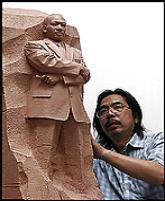
Photo courtesy of Lei Yixin
| A Show of Donna Salyer's Fabulous Furs - The World's Finest Faux Furs Wrapped up an exciting 18th Annual Kentucky International Trade Conference |
| Taiwan, China & Cincinnati USA: A Commentary on Things to Come in 2008 An Opinion by Charleston C K Wang, 1/12/2008 Yesterday, the people of Taiwan cast their votes for a new legislature and gave the opposition National Party (aka Kuomintang) a landslide victory (KMT 81 seats, Democratic Progressive Party 27 seats, Others 5 seats). Facing this debacle, President Chen Sui-Bian promptly announced his resignation as DPP chairman. Democracy again appears to be flourishing in Taiwan. The presidential election in Taiwan is scheduled for March 1 and I hope for another peaceful reaffirmation of the democratic process. For you see, democracy should suit not only the West, but Asia as well. In the meantime, China is feverishly putting on the final touches for the 2008 Summer Olympic Games scheduled to begin on August 8, 2008. By this world event, Beijing intends to showcase China as a world power in sports, economics, and whatever else that makes a Nation such. As a state under the solid tutelage of a single political party, much can be completed in the shortest time towards a national objective, in this case the hosting of tourists and sports enthusiasts from all corners of the Earth. True to the original spirit of the ancient Greeks who "invented" the Games as well as democracy, sports shall replace war, at least for the duration of the gathering under the Sanctuary of Zeus. Meanwhile, back in the USA, certain lawmakers in Congress have declared their intention to use the limelight of the Olympics to focus attention on their various grievances against Beijing. For example, Rep. Chris Smith, (R- N.J.) urged in an interview, "The Chinese want this ‘Show’ - with a capital ‘S’ - to showcase their government to the world. Congress should use that as leverage to ‘bring maximum scrutiny and light to their egregious human rights abuses.’" Global politics once again will scramble to bask under the glory of sports. Meanwhile, back in Cincinnati, Ohio, during the end of December, 2007, the Greater Cincinnati Chinese Chamber of Commerce completed an election for a new Board of Trustees. 17 volunteers were elected to the Board with a vote count ranging from a low of 11 to a high of 16 votes cast. The ballot permitted the caster to vote for 1 or all 17 of the candidates. Never mind the small number of voters, it was a good start - a small but nice tribute to the democratic process. The volunteers deserve our congratulations and the previous individuals who gave of their time and effort, our thanks. Given the global issues that are looming across the Pacific, just three of which are mentioned above, 2008 promises to be an interesting year for the Chinese Chamber. The US will feel the push from China and China will also be discomfited by movements in Taiwan and further west, from the USA. Cincinnati, despite that immortal quip of Mark Twain about our inability to sense the end of the world, surely will also feel every bulge and surge. Global love-hate pressures surely will be felt locally and in all directions. The Chinese Chamber must develop the vision to see what the future portends and maintain the wherewithal to turn the forces of challenge into showcases of opportunity. That famous adage, “Think Global and Act Local” is entirely appropriate here. The leadership of the Chinese Chamber must first think and then rise above personal self interest and pursue broad action for the common good. This means the provision of value to its membership, and the advance of the Chinese American community, and the community-at-large. And all in fair and commendable proportions. A conscientious effort must be made to avoid even appearances of favoritism and conflict-of-interest, maintain budgetary discipline, and provide transparency. Because of global forces from without and narrow forces from within, the pressure for discord is ever present but so are the opportunities to do good. I will observe and report back to you on these fronts as 2008 unfolds. WANGNEWS |

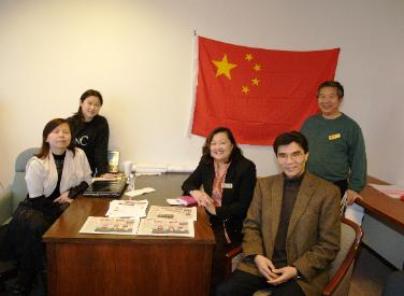
| ANNE PU, PUBLISHER OF ERIE CHINESE JOURNAL VISITS GREATER CINCINNATI CHINESE CHAMBER OF COMMERCE |

| GREATER CINCINNATI CHINESE CHAMBER OF COMMERCE LUNAR NEW YEAR GALA |
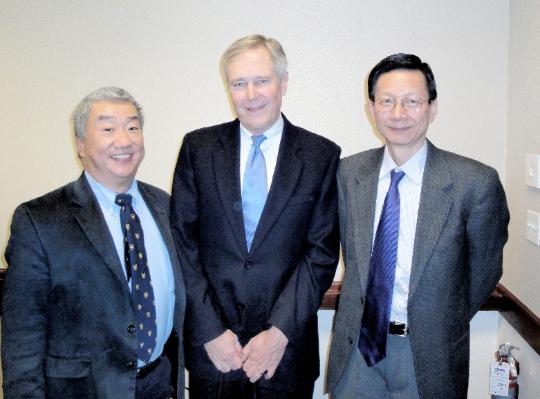

| Playing with Ghosts of the Asian Holocaust On June 7, 2007, former Taiwanese President, Lee Teng-hui, while in Japan,visited the Yasukuni war shrine and prayed in its inner hall because his brother is listed in the Shinto Book of Souls kept there. As Taiwan was under Japanese occupation from 1895 to 1945, his brother served with the Japanese Imperial Navy during World War II, was killed on duty during February 1945 in the Philippines, and is enshrined at Yasukuni. In televised comments, Mr. Lee proclaimed that it was a private affair and asked that his appearance at Yasukuni not be linked with either politics or history. But the fact is that he is a former President of the Republic of China and his politics radically favors an independent Taiwan, separate and distinct from China. In this respect, he will always have his supporters and detractors. Leaving politics aside, there is the greater issue of closing our eyes to history. Beginning in the late 19th century and culminating in defeat in 1945, Japanese imperialism had caused the deaths of tens of millions of civilians and prisoners-of-war throughout Asia with such brutality that these acts are referred to as the Asian Holocaust, or more charitably, Japanese war atrocities. Thousands of those who had played key roles in the atrocities were tried and convicted by Allied war crime tribunals. During the Second World War, Japan was one the Axis powers whose dream of a Fascist new world order cast a dark shadow on humanity across the face of the globe. Their ignominy is an indelible part of modern history. The fact is that while memory of such war crimes in China is particularly bitter (19 million died in the war), atrocities were committed in Asia and the Pacific islands wherever the Japanese military invaded and attempted to secure its conquest. The victims were civilians and military personnel from all over the world. This infamy has caused Japanese politicians to eschew Yasukuni which honors 1068 war criminals of World War II, including 12 top convicts, along with 2.5 million other Japanese war dead. Those Japanese politicians who do visit a memorial tainted with a Fascist legacy are regularly castigated by pubic opinion within their own country and certainly by those in the world who remember. So why would Mr. Lee make such a gesture that many Japanese politicians would think twice of doing? His core motive shall remain known only to himself and to the ghosts of war. The objections of the living can be objectively stated. Mr. Lee at Yasukuni is an affront to the memory of the victims of the Asian Holocaust. Mr. Lee’s presence at Yasukuni is an affront to all humanity who have lost family and friends to the atrocities of that sad period of our history, atrocities which all good people should remember in order they are never again repeated. If Mr. Lee’s true intention is to pay filial respect to his elder brother, in lieu of bowing, praying, and making other obeisance in a foreign shrine, would it not be more fitting for the former head- of-state to request his brother’s symbolic re-interment to a private family resting place in the land where he was born and which Mr. Lee loves so dearly, Taiwan? An Opinion by Charleston C. K. Wang, 6/20/07 |

Mr. Lee Wong, Trustee
West Chester Township
West Chester Township

Photo above: On 3/25/08, from left to right, Professor Man Bun Kwan (Q & A lecturer after the movie),
Mr. Tim Swallow, Director of Cincinnati World Cinema, and Professor I-Chih Wang (who was in
China during the attack on Nanking in 1937) were in attendance at the Cincinnati screening of
NANKING: The True Story of How a Few Brave Souls Saved the Lives of Thousands at the
Cincinnati Art Museum. NANKING made the shortlist for Best Documentary Film at the recent
Oscars. This heart- wrenching documentary relives through the diaries and eye-witness accounts
of survivors of the 1937 conquest of China's capital city, Nanking by the Japanese Army. This movie
documents the atrocities of the occupation that followed, commonly known as the "Rape of
Nanking." Oscar- winning directors Bill Guttentag and Dan Sturman present the recollections of a
few Americans and Europeans who elected to stay behind, resolving to protect others by creating a
"Safety Zone." This sanctuary, while temporary, is credited with saving the lives of up an estimated
quarter-million Chinese during the frenzied weeks of massacre. Sadly, another third of a million
perished. Members of the "The International Committee for Nanking Safety Zone" were Eduard
Sperling, Ernest Forster, George Ashmore Fitch, James McCallum, John Magee, John Rabe, Lewis
S. C. Smythe, Miner Searle Bates, Minnie Vautrin, P.R. Shields, and Dr. Robert O. Wilson. NANKING
was produced by Ted Leonsis after having read the book "The Rape of Nanking" by Iris Chang. To
read the write-up by Cincinnati World Cinema, click here. To see official NANKING site, click here.
Mr. Tim Swallow, Director of Cincinnati World Cinema, and Professor I-Chih Wang (who was in
China during the attack on Nanking in 1937) were in attendance at the Cincinnati screening of
NANKING: The True Story of How a Few Brave Souls Saved the Lives of Thousands at the
Cincinnati Art Museum. NANKING made the shortlist for Best Documentary Film at the recent
Oscars. This heart- wrenching documentary relives through the diaries and eye-witness accounts
of survivors of the 1937 conquest of China's capital city, Nanking by the Japanese Army. This movie
documents the atrocities of the occupation that followed, commonly known as the "Rape of
Nanking." Oscar- winning directors Bill Guttentag and Dan Sturman present the recollections of a
few Americans and Europeans who elected to stay behind, resolving to protect others by creating a
"Safety Zone." This sanctuary, while temporary, is credited with saving the lives of up an estimated
quarter-million Chinese during the frenzied weeks of massacre. Sadly, another third of a million
perished. Members of the "The International Committee for Nanking Safety Zone" were Eduard
Sperling, Ernest Forster, George Ashmore Fitch, James McCallum, John Magee, John Rabe, Lewis
S. C. Smythe, Miner Searle Bates, Minnie Vautrin, P.R. Shields, and Dr. Robert O. Wilson. NANKING
was produced by Ted Leonsis after having read the book "The Rape of Nanking" by Iris Chang. To
read the write-up by Cincinnati World Cinema, click here. To see official NANKING site, click here.
The Documentary NANKING at the Cincinnati Art Museum
Presented by Cincinnati World Cinema
Presented by Cincinnati World Cinema
| CHINESE NEW YEAR 2008 CELEBRATIONS Click on Photo For Complete Photonews Coverage |
Photos above: On 4/3/08 Xavier University in Cincinnati hosted a panel discussion on "China & Globalization"
in the Schiff Family Conference Center. Of all the challenges and opportunities that accompany
globalization, those posed by China are surely the most complex. Issues include food, water, the environment,
human rights, trade deficits, the U.S. to China debt, emerging markets, intellectual property rights and military
strength. With a population of 1.3 billion, an economy growing at about 10 percent annually and market
reforms that have opened up Chinese markets and allowed China to join the World Trade Organization, some
predict that the 21st Century will be the “Chinese Century” and China will replace the United States as the
dominant global actor. Shown in photo left are Dr. James Buchanan, Director of the Brueggeman Center,
asking a question of the three distinguished panelists who are seated at table from left to right:
Elizabeth Economy who is C.V. Starr Senior Fellow and Director of Asia Studies for The Council on Foreign
Relations. Her most recent book, The River Runs Black, won the 2005 International Convention of Asia
Scholars Award for best social sciences book. She is a frequent radio and TV commentator on U.S. -
China relations and regularly testifies before Congress.
Oded Shenkar who is Ford Motor Co. chair in Global Business Management, Fisher College of Business, The
Ohio State University. Shenkar holds degrees in East-Asian studies and sociology from the Hebrew University
of Jerusalem and a PhD from Columbia. He has taught at the Chinese University of Hong Kong, Hong Kong
University of Science & Technology, and the University of International Business and Economics in Beijing.
The Journal of Business Research has ranked him as the leading researcher in Chinese management.
Roger T. Ames who is professor of philosophy at the University of Hawaii and editor of Philosophy East and
West. Ames’ publications include translations of many Chinese classics and interpretations and studies of
Chinese philosophy and culture. His most recent efforts include articles promoting a conversation between
American pragmatism and Confucianism. Photo on right shows Dr. Buchanan with the audience.
in the Schiff Family Conference Center. Of all the challenges and opportunities that accompany
globalization, those posed by China are surely the most complex. Issues include food, water, the environment,
human rights, trade deficits, the U.S. to China debt, emerging markets, intellectual property rights and military
strength. With a population of 1.3 billion, an economy growing at about 10 percent annually and market
reforms that have opened up Chinese markets and allowed China to join the World Trade Organization, some
predict that the 21st Century will be the “Chinese Century” and China will replace the United States as the
dominant global actor. Shown in photo left are Dr. James Buchanan, Director of the Brueggeman Center,
asking a question of the three distinguished panelists who are seated at table from left to right:
Elizabeth Economy who is C.V. Starr Senior Fellow and Director of Asia Studies for The Council on Foreign
Relations. Her most recent book, The River Runs Black, won the 2005 International Convention of Asia
Scholars Award for best social sciences book. She is a frequent radio and TV commentator on U.S. -
China relations and regularly testifies before Congress.
Oded Shenkar who is Ford Motor Co. chair in Global Business Management, Fisher College of Business, The
Ohio State University. Shenkar holds degrees in East-Asian studies and sociology from the Hebrew University
of Jerusalem and a PhD from Columbia. He has taught at the Chinese University of Hong Kong, Hong Kong
University of Science & Technology, and the University of International Business and Economics in Beijing.
The Journal of Business Research has ranked him as the leading researcher in Chinese management.
Roger T. Ames who is professor of philosophy at the University of Hawaii and editor of Philosophy East and
West. Ames’ publications include translations of many Chinese classics and interpretations and studies of
Chinese philosophy and culture. His most recent efforts include articles promoting a conversation between
American pragmatism and Confucianism. Photo on right shows Dr. Buchanan with the audience.
Free Download
Click HERE
Due to size of file, please be patient.
Click HERE
Due to size of file, please be patient.
| MAYOR MARK MALLORY WELCOMES ERIE CHINESE JOURNAL TO CINCINNATI |
| Photocredit: Charleston C. K. Wang |
To read the Mayor's State of the City 2008, click here
Click on Photos For Larger View
TURNING THE LIGHT ON "CHINA & GLOBALIZATION"

| Ke Ming Playing the Pipa at China Earthquake Relief Fundraising Show 5/24/08 |
Date of Photo: 2/23/08
| ONE DAY IN JUNE, TWENTY YEARS AGO TianAnMen (6/4/1989)Revisited |
Click on Cartoon
Click on Op-Ed
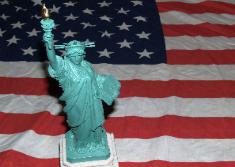

P.S.: On 1/30/2010, China suspended military exchanges with the United
States, threatened unprecedented sanctions against American defense
companies and warned Saturday that cooperation would suffer after
Washington announced $6.4 billion in planned arms sales to Taiwan. The
response to Friday's U.S. announcement, while not entirely unexpected,
was swift and indicated that China plans to put up a greater challenge
than usual as it deals with the most sensitive topic in U.S.-China relations.
For complete news report, click here.
States, threatened unprecedented sanctions against American defense
companies and warned Saturday that cooperation would suffer after
Washington announced $6.4 billion in planned arms sales to Taiwan. The
response to Friday's U.S. announcement, while not entirely unexpected,
was swift and indicated that China plans to put up a greater challenge
than usual as it deals with the most sensitive topic in U.S.-China relations.
For complete news report, click here.
| Photo on left: On 4/6/2009, Charleston Wang presented a lecture at the College of Business Administration of Miami University in Oxford, Ohio. The presentation entitled CONFUCIUS: The Key to Doing Business in the Pacific Rim in the 21st Century was given by invitation for students who will be going on travel-study program to China this summer. A summary of the lecture material may be downloaded free by clicking here. |
Date: February 23, 2008
| The agony of a changing China |
| CHARLESTON C. K. WANG, ESQ. PRESENTS MR. EVAN BROOKS, EXECUTIVE DIRECTOR OF THE GREATER CINCINNATI CHINESE CHAMBER OF COMMERCE WITH THE ORIGINAL BANNER FEATURING THE PROMOTION OF THE BEIJING SUMMER OLYMPIC GAMES 2008 "ONE WORLD-ONE DREAM." At the Taft Museum, Cincinnati , Ohio, USA on April 14, 2014. Mr. Wang is one of the founding members of the Cincinnati Chinese Chamber of Commerce. |
| Ms. Jacki Jing Master of Ceremonies Fox 19 Morning Anchor |

| Mr. Evan Brooks Executive Director Chinese Chamber |

| Mr. Lee Wong Trustee of West Chester Township |
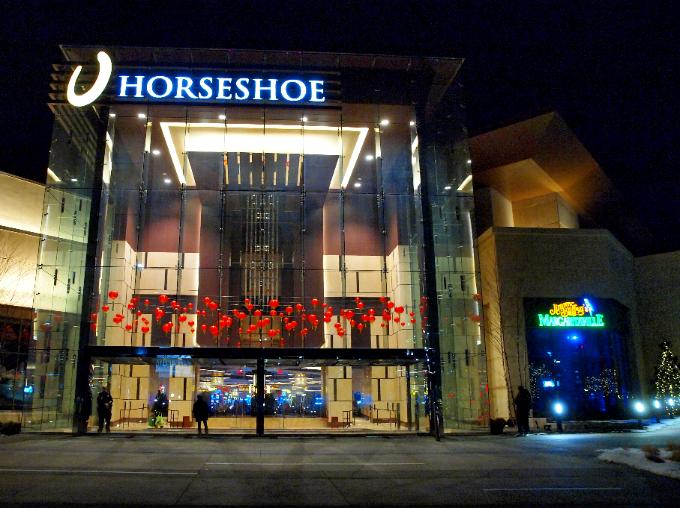
GONG XI FA CAI
| CHINESE NEW YEAR 4713 OF THE SHEEP CELEBRATED WITH THE GREATER CINCINNATI CHINESE CHAMBER OF COMMERCE AT THE HORSESHOE CASINO |
Date of Photo: 2/9/08
CHINESE NEW YEAR 4712 OF THE HORSE
CLICK ON PHOTO FOR LARGE VIEW
MORE VINTAGE
PHOTONEWS OF
GREATER CINCINNATI
CHINESE CHAMBER
OF COMMERCE >>>>
PHOTONEWS OF
GREATER CINCINNATI
CHINESE CHAMBER
OF COMMERCE >>>>
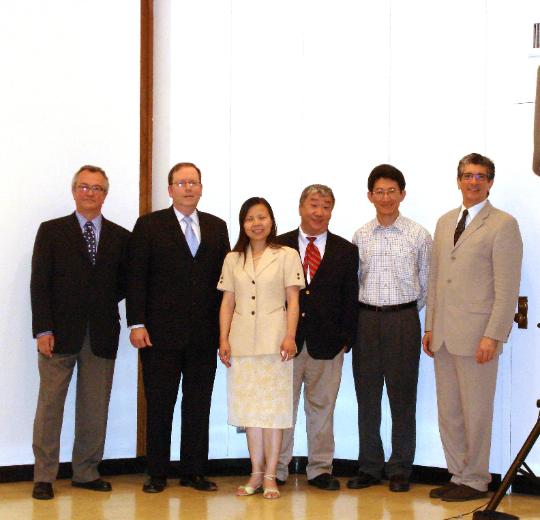



THE CHINESE ARE COMING! GCCCC Welcomes an Investment Delegation from Shandong Linyi, China. |
THE CHINESE ARE HERE! On 02/17/07, Officers of the Greater Cincinnati
Chinese Chamber of Commerce (GCCCC) welcomed to Cincinnati, Ohio, the
China Shandong Linyi investment delegation. Shown in picture above from left
to right are Mr. Deng, Mr. Bing, Ms. Du, Ms. Yang, Mr. Wang, Mr. Charlie Zhao
(president of GCCCC), Ms. Xiaojie Zavon (VP GCCCC) and Mr. Huang. The
visitors were treated to a Chinese New Year program sponsored by the Greater
Cincinnati Chinese School and held at the Sycamore High School, Montgomery,
Ohio. Photo courtesy of GCCCC.
Chinese Chamber of Commerce (GCCCC) welcomed to Cincinnati, Ohio, the
China Shandong Linyi investment delegation. Shown in picture above from left
to right are Mr. Deng, Mr. Bing, Ms. Du, Ms. Yang, Mr. Wang, Mr. Charlie Zhao
(president of GCCCC), Ms. Xiaojie Zavon (VP GCCCC) and Mr. Huang. The
visitors were treated to a Chinese New Year program sponsored by the Greater
Cincinnati Chinese School and held at the Sycamore High School, Montgomery,
Ohio. Photo courtesy of GCCCC.
PHOTOS ABOVE: On 02/16/2007, Paul C. F. Wang, Director of the
Commercial Division of the Taipei Economic & Cultural Office based in
Chicago visited the Queen City with two other members of his office. Shown
in above photo is Mr. Wang discussing the dynamic business opportunities
available in Taiwan to business and community leaders at a welcoming
luncheon at the Queen City Club in downtown Cincinnati. Standing to the
right of Mr. Wang is Ohio State Representative Jim Raussen and Joe Dehner,
Esq. a partner with the law firm of Frost Brown Todd. In addition to being a
well established trade partner of America, Taiwan is now positioned as a
leading high tech center and hub of innovation in the heart of Asia. The event
was hosted by Frost Brown Todd, LLC, Greater Cincinnati Chinese Chamber
of Commerce, Global Center of Greater Cincinnati, Northern Kentucky
International Trade Association, and Ohio Chinese American Professional
Association. Mr. Paul C. F. Wang is available to assist any company which is
interested in business in Taiwan and he can be reached at
paulwang@chicagocd.org
Commercial Division of the Taipei Economic & Cultural Office based in
Chicago visited the Queen City with two other members of his office. Shown
in above photo is Mr. Wang discussing the dynamic business opportunities
available in Taiwan to business and community leaders at a welcoming
luncheon at the Queen City Club in downtown Cincinnati. Standing to the
right of Mr. Wang is Ohio State Representative Jim Raussen and Joe Dehner,
Esq. a partner with the law firm of Frost Brown Todd. In addition to being a
well established trade partner of America, Taiwan is now positioned as a
leading high tech center and hub of innovation in the heart of Asia. The event
was hosted by Frost Brown Todd, LLC, Greater Cincinnati Chinese Chamber
of Commerce, Global Center of Greater Cincinnati, Northern Kentucky
International Trade Association, and Ohio Chinese American Professional
Association. Mr. Paul C. F. Wang is available to assist any company which is
interested in business in Taiwan and he can be reached at
paulwang@chicagocd.org
| NATIONAL CHINESE DELEGATION OF DISTINGUISHED DESIGNERS AND ARCHITECTS VISITS CINCINNATI Shown in photo below are members of the China Institute of Interior Designers visiting the University of Cincinnati (College Conservatory of Music Plaza) |
| OHIO STATE REPRESENTATIVE JIM RAUSSEN IS JOINED BY MEMBERS OF GREATER CINCINNATI CHINESE CHAMBER OF COMMERCE & OHIO CHINESE AMERCAN PROFESSIONAL ASSOCIATION IN A LUNCHEON TO EXPLORE DYNAMIC BUSINESS OPPORTUNITIES IN TAIWAN |


| Photo above On 5/14/2007, the State of Ohio signed a Memorandum of Understanding for trade promotion with the China Investment Promotion Agency. In photo below is the signing as witnessed by Charlie Zhao (furthest right) President of Greater Cincinnati Chinese Chamber of Commerce and Xiaojie Zavon (VP/ GCCCC on furthest left ). The Chinese Assistant Minister of Commerce, Mr. Chao Wang stands in the center. |



| TAFT MUSEUM OF ART HOSTS CHINESE CULTURE FEST: A delightful afternoon of art, music, food, and fun activities for all. The Greater Cincnnati Chinese Chamber was present. |

This is a WANGNEWS Fisheye Photo
| With Cincinnati Mayor Roxanne Qualls |
| "Charlie" Baisong Zhao, First Presdinet of the Greater Cincinnati Chinese Chamber of Commerce |


| On October 25, 2006, Baisong Zhao & Charleston C. K. Wang attended a Cincinnati USA Regional Chamber Luncheon featuring Vice President Dick Cheney |
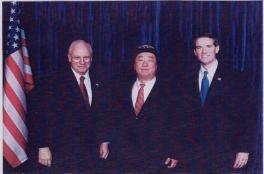

Reviewed by Charleston C. K. Wang, 6/2/2013



| Charleston C.K.Wang with James Fallows & Dr. Tom Lun-nap Chung at Xavier University's Presentation of "Does China Exist?" with James & Deborah Fallows October 27, 2011 |



| Dr. Santa Ono, President of the University of Cincinnati and Keynote Speaker |
| With Roxanne Qualls, former Mayor of Cincinnati |
| With Yuzhen Zhou University of Cincinnati |
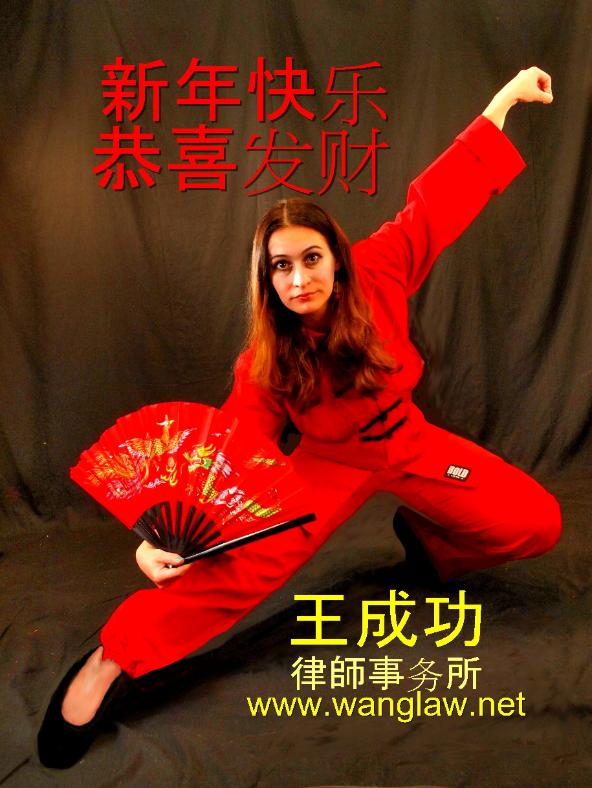

HAPPY CHINESE LUNAR NEW YEAR OF THE ROOSTER 2017 FROM WANGNEWS/WANGLAW
| 太極单鞭 Taiji Dan Bian Single Whip |
| STAY CALM READ WANGNEWS |
| GONG XI FA CAI www.wanglaw.net |

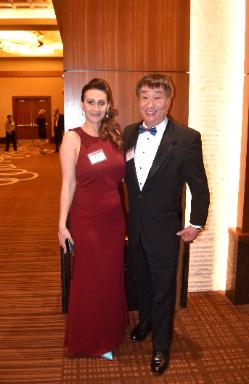
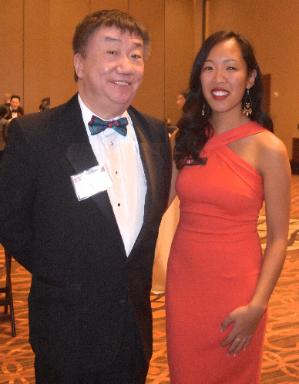
CHINESE NEW YEAR 4715 OF THE ROOSTER
GONG XI FA CAI
| Nazly Mamedova, Esq. Charleston C K Wang, Esq. WANGLAW www.wanglaw.net |
| Charleston C K Wang, Esq. Nazly Mamedova, Esq. WANGLAW |
| Nazly Mamodova, Esq, & Charleston C. K. Wang, Esq, WANGLAW Greater Cincinnati Chinese Chamber New Year Gala 2/10/2018 - Click on Photo for Full WANGNEWS Special |
| On February 7, 2006 representatives of Greater Cincinnati Chinese Chamber of Commerce met with Dr. Nancy L. Zimpher, President of the University of Cincinnati, and Dr. Mitch Leventhal, Vice Provost International, to discuss mutual interest in developing academic links between Cincinnati and China. |
| CHINESE NEW YEAR OF THE TIGER 2022 Midwest USA Chinese Chamber of Commerce Gala TQL Stadium, Cincinnati, Ohio, February 18, 2022 |
| CHINESE NEW YEAR OF THE TIGER 2022 Midwest USA Chinese Chamber of Commerce Gala TQL Stadium, Cincinnati February18, 2022 |
| Click on Photo to see more |
| Click on Photo to see more |



























